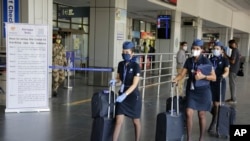Brian Contreras represents the worst fears of the profitable business travel industry.
Contreras is an account executive at an American technology company. He is used to traveling often for work. But now, he and thousands of others are working from home and calling into video meetings instead of getting on planes.
Contreras manages his North American accounts from Sacramento, California. He does not expect to travel for work again until the middle of 2021. Even then, he is not sure how much he will need to.
“Maybe it’s just the acceptance of the new normal. I have all of the resources necessary to be on the calls, all of the communicative devices to make sure I can do my job,” he said.
That situation could mean big trouble for hotels, airlines, meeting centers and other industries that depend so heavily on business travelers like Contreras.
Work travel represented 21 percent of the $8.9 trillion spent on worldwide travel and tourism in 2019. That information comes from the World Travel and Tourism Council.
Delta Air Lines CEO Ed Bastian recently suggested business travel might settle into a “new normal” that is 10 to 20 percent lower than it used to be.
He told The Associated Press, “I do think corporate travel is going to come back faster than people suspect. I just don’t know if it will come back to the full volume.” Right now, Delta’s business travel income is down 85 percent.
Mazen Hayek is the spokesman for MBC Group in Dubai. The media organization operates 18 television stations. Hayek says it is unlikely employees will travel as often once the coronavirus crisis ends because they have proven they do not need to.
MBC has reduced trips by more than 85 percent, Hayek said.
American technology company Amazon told its employees to stop traveling in March. It says the move has saved nearly $1 billion in travel costs so far this year. Amazon is the second-largest employer in the U.S., with more than 1.1 million employees.
Gary Kelly is the CEO at Southwest Airlines. He said money from business travel -- which normally makes up more than one-third of Southwest’s business -- is down 90 percent.
“I think that’s going to continue for a long time. I’m very confident it will recover and pass 2019 levels, I just don’t know when,” Kelly told the AP.
Peter Belobaba teaches airline management at the Massachusetts Institute of Technology. He said business travel is down partly because some people are afraid to fly.
But he adds that companies also fear being held responsible if employees are infected with COVID-19 while traveling for work. COVID-19 is the disease caused by the coronavirus. Those who want to travel may also be limited by travel restrictions, Belobaba added.
Last month, the CEO of electric car company Polestar, Thomas Ingenlath, had to observe a 14-day quarantine in China. He had flown in from Sweden for the Beijing Auto Show.
The decrease in travel has been very good for teleconferencing services. Zoom said 370,200 businesses with at least 10 employees had signed up for its service by the end of July. That is more than three times the number it had at the end of April.
But for some workers, teleconferencing cannot replace being there in person.
Rebecca Lindland is an automotive adviser and founder of Rebecca Drives. She used to travel 38 weeks each year for test drives and auto shows. This year, she did not fly from March until September. Test drives have been cut back to regional events, so attendees do not have to travel as far.
Lindland says she is confident she can return to air travel safely. She wears a face covering, and says that even before the pandemic she always carried disinfectant products.
Sam Clarke is an assistant professor in the college of business at California State University San Marcos. He agrees that some in-person events — like trade shows — will still be important in the future. But he thinks new kinds of business travel could also develop.
Clarke also expects some companies to change their travel policies. For example, he said companies could decide to let most employees work from home and then fly them all back to headquarters once a year.
I’m Jonathan Evans.
Dee-Ann Durbin and David Koenig reported on this story for the Associated Press. Jonathan Evans adapted the story for Learning English. Bryan Lynn was the editor.
________________________________________________________________
Words in This Story
confident – adj. certain that something will happen or that something is true
disinfectant – adj. a chemical substance that is used to kill harmful germs and bacteria; a substance that disinfects something
quarantine – n. the period of time during which a person or animal that has a disease or that might have a disease is kept away from others to prevent the disease from spreading
regional – adj. of, relating to, or characteristic of a certain geographic area
teleconferencing – n. the use of telephones and video equipment to have a meeting with people who are in different places
tourism – n. the activity of traveling to a place for pleasure
volume – n. an amount of something





